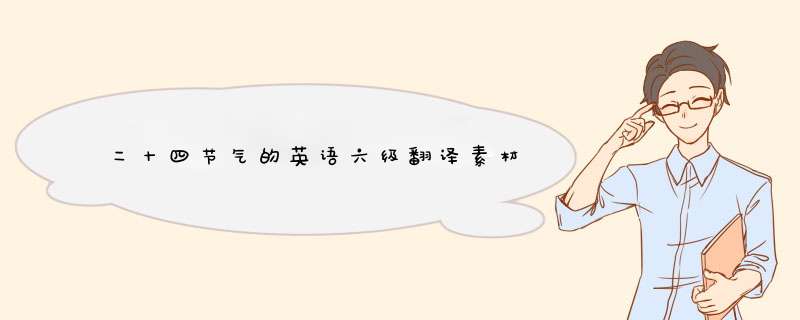
24节气包括12节气和12中气,反映了天气变化,指导农业耕作,也影响着人们的生活。下面是我分享的关于二十四节气的英语六级翻译,欢迎大家阅读!
二十四节气
24节气(24 solar terms)是统称,包括 12节气(12 majorsolar terms)和 12中气 (12 minor solar terms),它们彼此之间相互关联。24节气反映了天气变化,指导农 业耕作,也影响着人们的生活。春秋战国时期,人们开始使用节气作为补充历法 (calendar)。公元前104年,24节气最终确立。众所周知,中国是个有着悠久农业发 展史的国家。农业生产受自然规律影响极大。在古代,农民根据太阳的运动安排 农业生产活动。24节气考虑到了太阳的位置,这就是我们重视它的原因。
参考翻译
The 24 solar terms is a whole name of the systemthat consists of 12 major solar terms and 12 minorsolar teims linked with each other It reflects theclimate change, guides agriculture arrangements andalso affects people’s life In the Spring and AutumnPeriod and the Warring States Period, people began to use solar terms as the supplementarycalendar It was in 104 B,C that the 24 solar terms were finally set down As we all know,China is a country with a long history of agriculture Agricultural production is largely influencedby the laws of nature In ancient times, farmers arranged their agricultural activities accordingto the move of : the sun It is the fact that the 24 solar terms takes into account the position ofthe sun that makes us attach importance to it
翻译讲解:
1统称:即“全称”,可译为a whole/general name。
212节气:可译为12 major solar terms。在月首的叫做节气,如春分、谷雨等。
312中气:可译为12 minor solar terms。在月中的叫做中气,如立夏、立秋等。
4众所周知:可译为as we all know或as is know to all。
5自然规律:可译为the laws of nature。这里的'law不是“法律”,而是“规律”的 意思。
6根据太阳的运动:可译为according to the move of the sun。
7考虑到:可译为takeinto account。
8重视:可译为attach importance to。其中to为介词,后面要加名词、代词或动名词等。
中国二十四节气的英语翻译二十四节气 The 24 Solar Terms:
立春 Spring begins
雨水 The rains
惊蛰 Insects awaken
春分 Vernal Equinox
清明 Clear and bright
谷雨 Grain rain
立夏 Summer begins
小满 Grain buds
芒种 Grain in ear
夏至 Summer solstice
小暑 Slight heat
大暑 Great heat
立秋 Autumn begins
处暑 Stopping the heat
白露 White dews
秋分 Autumn Equinox
寒露 Cold dews
霜降 Hoar-frost falls
立冬 Winter begins
小雪 Light snow
大雪 Heavy snow
冬至 Winter Solstice
小寒 Slight cold
大寒 Great cold
;名称 Name 开始日期Beginning
立春 the Beginning of Spring (1st solar term) Feb3,4,or 5
雨水 Rain Water (2nd solar term) Feb18,19 or 20
惊蜇 the Waking of Insects (3rd solar term) Mar5,6,or 7
春分 the Spring Equinox (4th solar term) Mar20,21 or 22
清明 Pure Brightness (5th solar term) Apr4,5 or 6
谷雨 Grain Rain (6th solar term) Apr19,20 or 21
立夏 the Beginning of Summer (7th solar term) May 5,6 or 7
小满 Lesser Fullness of Grain (8th solar term) May 20,21 or 22
芒种 Grain in Beard (9th solar term) Jun5,6 or 7
夏至 the Summer Solstice (10th solar term) Jun21 or 22
小暑 Lesser Heat (11th solar term) Jul6,7 or 8
大暑 Greater Heat (12th solar term) Jul22,23 or 24
立秋 the Beginning of Autumn (13th solar term) Aug7,8 or 9
处暑 the End of Heat (14th solar term) Aug22,23 or 24
白露 White Dew (15th solar term) Sep7,8 or 9
秋分 the Autumn Equinox (16th solar term) Sep22,23 or 24
寒露 Cold Dew (17th solar term) Oct8 or 9
霜降 Frost's Descent (18th solar term) Oct23 or 24
立冬 the Beginning of Winter (19th solar term) Nov7 or 8
小雪 Lesser Snow (20th solar term) Nov22 or 23
大雪 Greater Sonw (21th solar term) Dec6,7 or 8
冬至 the Winter Solstice (22th solar term) Dec21,22 or 23
小寒 Lesser Cold (23th solar term) Jan5,6 or 7
大寒 Greater Cold (24th solar term) Jan20 or 2
The 24 solar terms
Spring, rain water, insects, the spring equinox, the tomb-sweeping day, grain rain, of summer, grain full, grain in ear, the summer solstice, slight heat and great heat, beginning of autumn, the limit of heat, the millennium, autumnal equinox, cold dew, frost, the beginning of winter, light snow, heavy snow, the winter solstice, slight cold, severe cold
传统二十四节气
英文翻译如下:
立春Beginning of Spring
雨水Rain Water
惊蛰Insects Awakening
春分Spring Equinox
清明Fresh Green
谷雨Grain Rain
立夏Beginning of Summer
小满Lesser Fullness
芒种Grain in Ear
夏至Summer Solstice
小暑Lesser Heat
大暑Greater Heat
立秋Beginning of Autumn
处暑End of Heat
白露White Dew
秋分Autumnal Equinox
寒露Cold Dew
霜降First Frost
立冬Beginning of Winter
小雪Light Snow
大雪Heavy Snow
冬至Winter Solstice
小寒Lesser Cold
大寒Greater Cold
1、春节
春节,即农历新年,是一年之岁首。春节历史悠久,由上古时代岁首祈年祭祀演变而来。春节的起源蕴含着深邃的文化内涵,在传承发展中承载了丰厚的历史文化底蕴。在春节期间,全国各地均有举行各种庆贺新春活动,热闹喜庆的气氛洋溢。
The Spring Festival, the Lunar New Year, is the first year of the year The Spring Festival has a long history and evolved from the annual prayers of the ancient times
The origin of the Spring Festival contains profound cultural connotations, and it carries a rich historical and cultural heritage in the inheritance and development
During the Spring Festival, various celebrations of the New Year are held throughout the country, and the atmosphere of lively and festive atmosphere is overflowing
2、元宵节
元宵节,是每年农历正月十五日,是中国的传统节日之一。根据道教“三元”的说法,正月十五日又称为“上元节”。元宵节习俗自古以来就以热烈喜庆的观灯习俗为主。
Lantern Festival is the 15th day of the first lunar month and is one of the traditional festivals in China
According to the Taoist "three yuan", the 15th day of the first month is also known as the "upper yuan festival" Since the ancient times, the custom of the Lantern Festival has been dominated by the warm and festive lighting customs
3、清明节
清明节,源自上古时代的春祭活动,兼具自然与人文两大内涵,既是自然节气点,也是传统节日。清明节是传统的重大春祭节日,扫墓祭祀、缅怀祖先,是中华民族数千年以来的优良传统。
The Ching Ming Festival, originated from the ancient festival of spring festival activities, has both natural and humanistic connotations, both natural and traditional festivals
The Ching Ming Festival is a traditional major spring festival festival It is a fine tradition of the Chinese nation for thousands of years to sweep the tombs and cherish the ancestors
4、端午节
端午节,是中国民间的传统节日。端午节源自天象崇拜,由上古时代龙图腾祭祀演变而来。端午节的起源涵盖了古老星象文化、人文哲学等方面内容,蕴含着深邃丰厚的文化内涵。
The Dragon Boat Festival is a traditional Chinese folk festival The Dragon Boat Festival originated from the celestial worship, which evolved from the ancient totem of the ancient totem
The origin of the Dragon Boat Festival covers the ancient astrological culture, humanistic philosophy and other aspects, and contains profound cultural connotations
5、七夕节
七夕节,是中国民间的传统节日,为传统意义上的七姐诞,因拜祭活动在七月七日晩上举行,故名“七夕”。经历史发展,七夕被赋予了“牛郎织女”的美丽爱情传说,使其成为了象征爱情的节日,从而被认为是中国最具浪漫色彩的传统节日,在当代更是产生了“中国情人节”的文化含义。
Qixi Festival is a traditional Chinese folk festival It is the birth of the Seven Sisters in the traditional sense
The worship event was held on July 7th, hence the name "Qi Xi"
Through the development of history, Tanabata has been given the beautiful love story of "The Cowherd and the Weaver Girl", making it a symbolic love festival, which is considered to be the most romantic traditional festival in China
In the contemporary era, it has produced "Chinese Valentine's Day" Cultural meaning
-中国传统节日
欢迎分享,转载请注明来源:浪漫分享网

 微信扫一扫
微信扫一扫
 支付宝扫一扫
支付宝扫一扫
评论列表(0条)